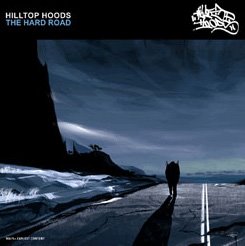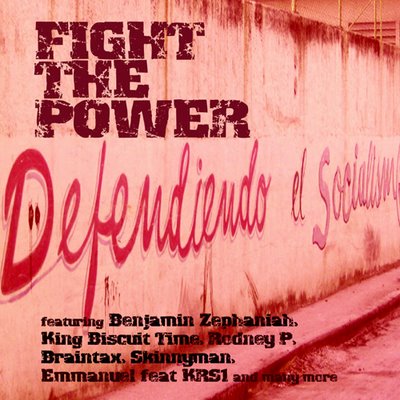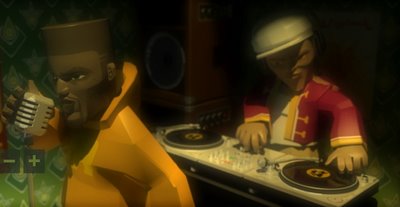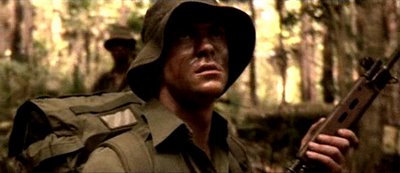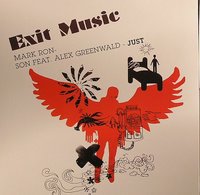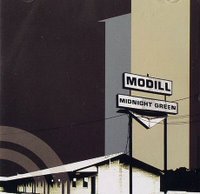 Rappers Omar Chakaki, left, the Syrian-American lead singer of The NOMADS, and Tayeb Ibrahim, perform at the Coda lounge, Thursday, March 16, 2006, in New York. (AP)Arab-Americans rap about Israeli "domination"
Rappers Omar Chakaki, left, the Syrian-American lead singer of The NOMADS, and Tayeb Ibrahim, perform at the Coda lounge, Thursday, March 16, 2006, in New York. (AP)Arab-Americans rap about Israeli "domination"They rap about checkpoints, military
"oppression" and refugee camps:
"Domination from another nation; we used to be brothers like Cain; now they got us living under occupation."by Associated Press
Their songs express longing for Jerusalem and anger at the hardships of life in the Gaza Strip and West Bank. But they grew up in Tennessee or Virginia, live in Los Angeles and perform in New York City. Far away from the their parents' homeland in the Middle East, Arab-American rappers are trying to find their own voice in the United States - expressing the frustrations of the Muslim world at a time when anti-Islamic feelings are on the rise following the Sept. 11 attacks.
Their neophyte movement is spurred on by the success that rap and hip-hop have in voicing the grievances and reflecting the lives of other minorities in the United States.
Two of the Arab-American rappers,
Omar Offendum and
Ragtop of Los Angeles, are on the forefront of this small but growing trend in hip-hop music.
"Hip-hop has always been trying to voice resistance in the face of oppression," said Omar Offendum, the performance alias of 24-year-old Omar Chakaki.
"And if you're growing up Arab, politics are very important because they affect every level of your life in many different ways.""There's definitely a feeling of solidarity with other minorities, like African-Americans, and not just when it comes to the music," added Ragtop, 25, whose real name is Nizar Wattad.
"Palestinians in Israel and the territories are also second-class citizens." Their political lyrics resonate with young Arab-Americans. During a concert last week, more than 300 fans of mainly Middle Eastern background squeezed into the Coda Club in midtown Manhattan. The gig was organized by the Network of Arab-American Professionals of New York and the bands themselves. Clapping and singing, the crowd enthusiastically applauded the hip-hop performances of
Wattad and
Chakaki.
The two artists rapped in English and Arabic, combining electronic samples of popular and classical Arabic music from their parents' generation with fast hip-hop drum beats.
"I place my palms to the east where my people seek peace, and freedom from police control, checkpoints and patrols," Wattad and Chakaki rhymed in the song
"Free the P" which stands for
"Free the Palestinians." "Domination from another nation; we used to be brothers like Cain; now they got us living under occupation."
Wattad, who is of Palestinian origin and heads The Philistines, and Chakaki, the Syrian-American lead singer of
The NOMADS, are currently on tour and have already played in Detroit, Dearborn, Michigan, and Oberlin, Ohio. The two rappers will perform in Vancouver on Friday.
They are promoting their co-produced album which like their duet is also called
"Free the P," a compilation of spoken word and hip-hop that features 24 different artists from the U.S., Canada and the Middle East. While many of their songs focus on the plight of Palestinians, Wattad and Chakaki also rap about their own experiences as Arabs, and Arab-Americans, in a post-Sept. 11 world where suspicion of Muslims runs high.
"After 9/11, I got stripped-searched on 17 flights in a row," said Wattad, offering an example of what he perceives as growing discrimination against Arabs in the United States. Despite their anger about incidents like this, the two rappers reject violence as a solution for conflicts.
"We don't believe in violence on either side of the conflict," said Wattad, referring to the Israeli-Palestinian conflict.
"If we can help to clear up the hate, we'd even play together with an Israeli band."While Arab immigrants in Europe and Palestinian youths in Israel and the occupied territories have been expressing their political frustrations and anger through hip-hop for many years, the Arab-American version of rap is a relatively new phenomena.
In North America, there are only a few other Arab-American rappers like the
Iron Sheik from Oakland, California, or the Iraqi-Canadian band
Euphrates. Wattad and Chakaki have independently been producing rap songs for more than three years and both recorded a CD. But it is only in recent months that their music has gotten much media attention and that they have established a fan community. They hope that eventually their fans will include people beyond the Arab-American community. At last week's concert at the Coda Club, they managed to recruit some new fans, though mostly still of Arab descent.
"They are very political but that is part of who we are," said Mayida Zaal, a 27-year old design student of Palestinian background who had just bought the
"Free the P" CD for her cousins.
"This music is like the original hip-hop from the Bronx before it was commercialized," said Zaal.
"I think their music has a future."• Check for The Nomads on
MySpace.
•
Middle East Affairs article with some good links for Arab American/Canadian hip hop crews. Including the
Free the P compilation & the amazingly refereshing
Slingshot documentary.


